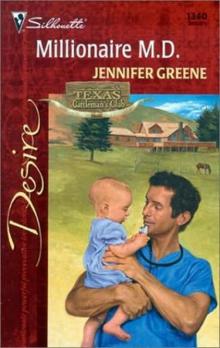- Home
- Jennifer Greene
The Unwilling Bride Page 2
The Unwilling Bride Read online
Page 2
The fire was out and the hoopla over almost faster than she could spit. The kitchen was still choking from the stench of the burned bread and acrid extinguisher spray, but even that was dissipating quickly. Her stranger hadn’t slowed down yet. One window was already cracked open—her wood stove could toast a small country if there was an outlet for the heat—but now he threw up the sashes on all the rest of the windows. Nice, freezing, seventeen-degree Vermont winter air poured into the room like a blessing.
Her heart was still slamming, so it took a few seconds to get her breath back and assess the damages. The ancient wood stove had a fresh, new coat of blacking, but the old baby had survived fires before. A few more soot stains only added to its character. For the hundredth time she consoled herself that her gift for intense concentration was a wonderful thing, not a dismally disgusting character flaw. Her life would just run smoother if she paid an eensy bit more attention to real life. Thank God, though, it really didn’t appear that there was any serious harm done.
The bear seemed to reach the same conclusion. He whipped around and pinned her with a studying stare. “You okay, fruitcake?”
She blinked. Again.
“Ah. Fruitcake is wrong word, I know.” He thought fast. “Cupcake. You okay, my cupcake?”
She dry-washed her face with a hand. It didn’t seem the time to suggest some changes in his vocabulary to adjust for twentieth century feminist American values. Not before they’d even been introduced. And not while he was beaming at her with a big, brawny, unnervingly sexy grin that somehow made her…rattled.
“I saw smoke from my house. Just little bit, coming from you one open window. Good thing I saw that, huh, lambchop? All gone now. No hurt done. You okay, you house okay, happy to be of rescue.” He held out his hand. “I am Stefan Michaelovich. Your neighbor.”
“Paige Stanford. And I’m grateful that you spotted the smoke so quickly. Thank you for, um, rescuing me.” Returning his handshake was just basic manners. Paige had no idea how such an innocuous, automatic courtesy turned into something else.
His palm clapped against hers and then just laid there—he didn’t pump or shake; he just held her hand in a capturing squeeze. Perhaps people shook hands differently in Russia? She had no problem with that. It was just that the connection was tighter than a plug in a socket, and she wasn’t prepared for the electric shock.
His hand was swallowing bigger than hers, and warm. His grip had all the muscular power of a physically active man, yet his skin was smooth and unscarred, his nails pared short and clean. By contrast, her hands were a disgrace. Nothing new. Unavoidably she picked up calluses and cuts from working so many hours with chisels and carving tools. She never thought about her hands—who cared?—but she was suddenly, strangely conscious of every knuckle and nail, every surface of texture that touched his.
Seconds spun out. She kept expecting him to release her hand. Instead his eyes charged over her face as the warmth of his palm seeped into hers. A clock ticked somewhere. Radiators clanked on. Cold, sharp air gushed from the windows, rapidly obliterating the last of the smoke, and still his gaze honed on her face, stalking every feature as if fascinated by her eyes and nose and mouth.
She had an ordinary nose. Plain old brown eyes. An average mouth with no lipstick or gloss. Her bulky denim overalls entirely concealed her figure, and by this time in the day the single braid dangling down her back was undoubtedly sloppy and askew.
Years and years ago, Paige couldn’t find a skirt tight enough, a sweater skimpy enough, but that was back when she’d been a wild, reckless girl who was determined to test and tease her new feminine powers on every passing boy. She’d wiped every trace of that teenage girl off the map. Fiercely. Completely. Eons ago. There was nothing suggestive about her appearance now—absolutely nothing.
Yet the stranger seemed to find something in her looks that captivated him. He wouldn’t stop looking at her, his attention absorbed, as if he were learning things about her from the nest of their palms and the look of her face. Things she didn’t know. Things she didn’t see when she looked in a mirror.
“Mr. Michaelovich—” she began uneasily.
He swiftly corrected her. “Stefan.”
“Stefan, then. I—” But abruptly she forgot whatever she’d planned to say, because that simply, he released her hand and she was free again. Those few seconds of unnerving silence might never have been. The way he looked at her, the brush of those midnight black eyes on her face and body, the electric plug of awareness between his palm and hers…she must have, simply must have, imagined it.
She drew herself up to her full five foot seven inches, and mentally scrambled for something intelligent and neighborly to say. There wasn’t a man in Walnut Woods that she didn’t get along with; she never had a problem relating with a guy one-on-one—and he certainly wasn’t going to be the exception. “So…you’re living in the old Jasper place?”
“Yes. Just down your road.”
Since that seemed to awkwardly end the conversation, she scrambled for something more. “Are you here with your wife and family?”
A slow waltz of a smile. He was pleased she’d asked. “No wife. No small ones. But the Borges in town—they are family, third cousins, maybe four. They are how I came here, to your Vermont, instead of L.A. or Georgia or Texas. This was only place I had a family from Russia, so good to start from.”
“You plan to stay?”
“To stay in America—oh, yes. I am already studying to become citizen. But am only living in Walnut Woods for couple months, temporary until I figure out jobs and where best to settle. My work is physics. For now I have computer hooked up, real cool, real groovy, can do much work this way. In the long time, though, I will need to find my own kind.”
Although his accent was thick, he wasn’t that hard to understand. She mentally translated “in the long time” to mean “in the long run” and almost chuckled at his use of the ancient “groovy” slang. It was just his last comment that she couldn’t comprehend. “By your own kind, do you mean other Russian people?”
“No, no. Being Russian, not important. French, German, Japanese, would make no difference, either. I mean finding other people in physics, like me, a lab or university where we talk the same work. This is why I come here. Important, this freedom and right to talk with each other. We have many, many problems affecting whole planet. Cannot fix these nature of problems unless we all have freedom to talk together. So I come to America to melt in your pot.” He hesitated. “Have I said it right, about melt in the pot?”
“Right enough. The phrase is ‘melting pot’. People say that America is a melting pot of different cultures.” He sounded like a hard-core idealist, she mused, which somehow didn’t surprise her any more than his physicist background. Never mind the over-whelming shoulders and that wild beard. He only appeared to be an uncivilized bear at first glance. He hadn’t missed anything yet. Those black eyes were shrewd, swift, sharp with intelligence—and maybe saw too much for a woman’s own good.
“I struggle. Reading the language, no problem, and the words in my work, I know. But talking everyday words…” He shook his head with an exuberant grin. “Your language can make me tired quick.”
“You’re doing fine,” she assured him.
“Nyet. Will take time. But I get there. Will be happy when I get past all this struggling part.” He shifted on his feet and looked around again. “Well…you want help cleaning up this mess?”
“No, no. I can handle it myself.”
“Could have had big fire. You work hard concentrating, you forget things like fire, huh? No one else here? Like husband?”
“No, I live alone.” Everyone in town knew she lived by herself, so there was no point in being less than honest.
“Hmm.” She wasn’t sure what he was assessing with that long, lingering hmm, but his gaze was suddenly all over her face again. Then, with one swift move, he pushed away from the counter and loped for the door. “Well, I go hom
e. But you know now I live close if you need help, yes?”
“Yes. And that’s very kind.” She followed him to the door and had just grabbed for the knob when he suddenly pivoted around.
“If it’s an okeydoke, I would sure like to get it on with you, babe.”
Her jaw had to drop a full inch.
“Uh-oh. I say something to offend? I mean to say…hope to see you again. Hope you might put up with my learning new English sometimes? Be like neighbors, friends?”
“I…sure.”
A flash of another high-voltage grin, and then—finally—he was gone. Paige closed the door behind him with a massive sigh of relief. She shook her head. Of course he hadn’t meant that “get it on with you, babe” in a sexual context.
Stefan was obviously having some problems coping with a new language. That someone had taught him a ton of colloquial expressions wasn’t helping. He undoubtedly didn’t realize what he was saying.
The room was freezing—no surprise, with all the open windows—and Paige abruptly hustled to shag them all down and latch them again. When she reached the far south pane, though, she yanked down the window and then hesitated. From that view she could still see him, his shaggy head thrown back as he chugged down her snowy driveway, past the old stone fence until he crossed the road out of sight.
Vermont was Robert Frost country, and her stone fence was typical of a New England neighborhood that strongly believed Frost’s philosophy about good fences making good neighbors. Her friends and neighbors all knew she was a hopeless hermit—a happy hermit—and respected her workaholic habits. Everyone knew better than to interrupt her workday.
Somehow she didn’t think the gregarious Russian had ever read Frost.
As she ambled back toward her workshop, she told herself it didn’t matter. They weren’t likely to run into each other that often. Positively, though, it would be cruel to be unfriendly when they did. If he blithely ran around calling women “babe” and “cupcake” and boisterously suggesting “they get it on,” some woman was going to lynch him.
It wouldn’t kill her to give him a little language coaching. He had to be lonely, trying to adjust to a new country, a new place, new ways.
Paige knew about loneliness. She knew all about having trouble fitting in. Old memories suddenly pushed through her mind like bubbles rising to the surface of a pond. She pushed them back down.
At twenty-seven, she was secure and content with her life-style. Maybe she’d once been as flighty as a fickle wind, but that unfortunate period in her life was long over. These days, nothing budged her from her steady course—except, of course, for that dadblasted strange cameo waiting for her attention in the workshop. Her mind turned to her sisters and to the work waiting for her.
Her new neighbor was about as restful as a tornado. But he was basically just a stranger passing through. No one she needed to worry about. No one who was going to affect her life.
Paige had survived tornadoes before.
Two
The computer screen glowed in the dark, illuminating a complex jumble of mathematical numbers and equations. “No, no, no” Stefan typed on the keyboard. “Four years ago, discovered this didn’t work. Look at line 47. The problem in logic begins there….”
When he finished with the post, he leaned back and rubbed his tired eyes. The mathematician he’d been communicating with lived in Paris, outside the Sorbonne. Through the wonders of a computer, modem and an internet connection, Stefan could teach or argue theory or share ideas with some of the finest scientific minds in the world.
He’d been in America three weeks. Long enough to discover that freedom was far more addictive than any drug. He couldn’t get enough of it.
Growing up in Russia, he had been isolated because of his brain. Patriotism had been drilled into him when he was young—his mind belonged to the state. Forget a movie with popcorn; forget falling in love; forget taking a passel of kids sledding on a snowy afternoon. His brain was a gift, and he had a responsibility to produce for his country, to channel all his drive and abilities toward that goal.
Stefan had no quarrel with any of that. He’d accepted the loneliness, accepted his responsibilities. He never saw the conflict coming that would slowly eat him alive. But physics was his field. Energy. In a world with finite resources, energy problems—and solutions—had increasing power over war, peace, economics, quality of life. Solutions existed, if scientific minds across the world could simply talk together, share what they knew. Repression of knowledge was alien to everything he believed in. Suffering had no country. Certain problems were universal and had no flag. And when he’d had a breakthrough, and discovered he would not be permitted to share his research with other physicists across the world, that was the straw that had broken the donkey’s back.
He’d started saving his rubles. Enough to give him a solid nest egg in America. It took a long time—too long—but the waiting had intensified his feelings and his resolve. America was his country long before he set foot on her soil.
Impatiently he flicked off the computer. The living room flooded with darkness. For a few minutes, there was no sound in the whole house beyond the rumbling of the furnace and the rhythmic tick of a distant clock. As his eyes slowly dilated, he focused on the view from his window, where the snowy landscape was mystically glazed by moonlight. Down the winding road, he saw lights. Her lights.
Thinking about Paige had started to drive him crazy.
He lurched out of his desk chair and ambled to the casement windows. Paige slept in the corner room on the second story of the old brick farmhouse. He guessed the location of her bedroom, because lights never emanated from any other room on that floor at night.
Right now, it was just nine o’clock, and the second story was predictably blacker than pitch. She hadn’t gone to bed yet. But she would—around a quarter to eleven. Her bedtime rituals were as regular as a heartbeat.
Stefan never meant to make a pattern of watching her. One night he’d just happened to glance out, and caught her standing in the window with the light behind her, as she took down her braid. Her house was four hundred yards distance from his, not close enough to see clearly, but close enough to appease his conscience about being a voyeur. He had never seen anything he shouldn’t. She was never naked. Never remotely unclothed. In fact, she seemed to favor sleeping in some big, voluminous garment that resembled a feed sack.
Personally he thought she belonged in satin.
Taking down her hair was the last chore she did before sleeping. She stood at the window, stargazing while her fingers unplaited the long, tangled braid. Then she brushed her hair, always with swift, impatient movements, as if doing a necessary job for the sole purpose of getting it over with.
Personally, he would have brushed her hair quite differently.
When her hair was finally loose, it streamed down her back in a waterfall, past her shoulder blades, as rich as mink, silken, glossy. A man could go crazy, imagining his hands in that hair. Her arms were raised when she brushed back from the crown, and even in that appalling sackcloth garment, her breasts pushed and thrust against the fabric. A man could go crazy, imagining his hands on those firm, full breasts.
She couldn’t be a virgin. Stefan had carefully studied all the American newspapers. He wasn’t sure how old Paige was, maybe mid-twenties. But it was clear no American women were virgins past the age of sixteen. They talked about sex everywhere: ads, TV, movies, national news. Stefan figured he could not assimilate into the culture until he figured such things out—he would not want to offend some woman sometime by accidentally inferring that she did not have reams of sexual prowess and expertise. This was hard. In his country, it was okay if a woman had not slept with the entire Bronco Bills baseball team. Here, a guy might be considered disgustingly repressed if he failed to talk about sex—or worse, if he considered sex to be an intimately private subject. Stefan was trying hard to get on the band tire.
Paige, though, struck him as being on
a different band tire, too. Though it seemed impossible, he couldn’t shake the impression that she was asleep as a woman.
He’d seen her working attire—no makeup, the tight braid, the bulky, concealing clothes. Yet it was only natural that she would choose practical, common sense clothing styles with her work. There was a storm of dreams in her dark brown eyes, the passion of emotion. Her movements had an inherent sensuality and grace. And her face had a classic beauty, a damn near mesmerizing beauty, yet she seemed completely unaware of her looks, or how those looks could affect a man.
The morning of the fire, he’d seen the jade cameo in her workshop. It was her. Exactly her. At the time, he hadn’t realized it because his mind had been on the fire. But later, the profile in that jade cameo had come back to haunt him. Later, he’d considered that a woman who created cameos had to have a deeply romantic nature.
Yet she lived alone. Stefan kept an eye out, not just from nosiness but because if she was so absentminded as to start one fire, she could certainly start another. No one watched out for her. No men came calling. She worked all the time, and only seemed to leave the house for groceries. Yet night after night, watching her in that window, he’d seen her vulnerability and loneliness.
He knew loneliness well, but there had always been reasons why it had been difficult to pursue a mate in his life. It was a mind-boggling puzzle why she didn’t have a man in hers.
For three weeks, that puzzle had been gnawing on his mind.
Longer than a man who thrived on challenges could be reasonably expected to stand.
Swiftly he turned his head from the window. His gaze pounced on the telephone. He’d mastered the telephone book his first week in America, read the entire Yellow Pages one night. Finding the number for “Stanford, Paige” was a piece of cake. He considered for a minute, then dialed her number and carried the telephone over to the window.

 The Unwilling Bride
The Unwilling Bride Wild in the Moment
Wild in the Moment No More Mr. Nice Guy
No More Mr. Nice Guy Secretive Stranger
Secretive Stranger Sunburst
Sunburst The Soon-To-Be-Disinherited Wife
The Soon-To-Be-Disinherited Wife Man From Tennessee
Man From Tennessee Mackinnon 03 - The Bonus Mom
Mackinnon 03 - The Bonus Mom Tender Loving Care
Tender Loving Care Can’t Say No
Can’t Say No The 200% Wife
The 200% Wife Wild in the Moonlight
Wild in the Moonlight Trouble in Paradise
Trouble in Paradise Millionaire M.D.
Millionaire M.D. A Daring Proposition
A Daring Proposition Silver and Spice
Silver and Spice Mesmerizing Stranger
Mesmerizing Stranger Bachelor Mom
Bachelor Mom Blame it on Cupid
Blame it on Cupid Pink Satin
Pink Satin THE HONOR BOUND GROOM
THE HONOR BOUND GROOM Sweets to the Sweet
Sweets to the Sweet The Baby Bump
The Baby Bump Ain’t Misbehaving
Ain’t Misbehaving Cupid’s Confederates
Cupid’s Confederates You Belong to Me
You Belong to Me Yours, Mine & Ours
Yours, Mine & Ours Little Matchmakers
Little Matchmakers Hot to the Touch
Hot to the Touch Conquer the Memories
Conquer the Memories Kisses From Heaven
Kisses From Heaven Pink Topaz
Pink Topaz Blame It On Paris
Blame It On Paris Irresistible Stranger
Irresistible Stranger The Billionaire’s Handler
The Billionaire’s Handler Wild in the Field
Wild in the Field Wintergreen
Wintergreen The Baby Chase
The Baby Chase